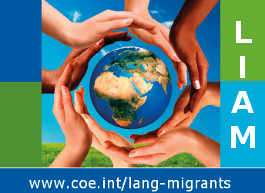Motivation in language training for adult migrants
Language courses for migrants should be designed to assist them in:
- Raising their communicative competence in the language of the host country while meeting their perceived needs
- identifying and formulating their language needs related to personal activities, employment and their particular situation (children at school, occupation...)
- overcoming any doubts they may have about their ability to learn the language of the host community to the level they need.
Migrants often demonstrate a strong desire to be successful and approach learning their new language with commitment and energy. It is therefore appropriate to devise and implement positive incentive-based policies for those migrants who may not independently take the necessary initiatives, for example, by availing themselves of possibilities for personal tuition or enrolling in a suitable language programme.
Imposing vs fostering conditions
However, this positive approach is not a universal feature of migrant language education. As recent surveys by the Council of Europe confirm, a number of countries impose conditions which can result in penalties or sanctions, if a migrant is considered not to meet the stated requirements. For example, irregular attendance at an obligatory language course may result in a reduction in financial or social benefits while failure to pass a test can lead to loss of a residence permit, or refusal of citizenship, or authorisation to enter a country for the purposes of family reunification.
Certain conditions linked to sanctions may be perceived by migrants as posing unrealistic demands or insurmountable obstacles. This situation can lead to resentment or anxiety, with a consequent reduction in the motivation needed for successful language learning.
Increase motivation
While there are good reasons for encouraging migrants to learn the language, forcing them to attend a course, learn a language or take a test may result in weak external motivation with poorer results than would otherwise have been achieved by incentives that lead to stronger personal motivation. Migrants, like any other learners, are more likely to succeed when language programmes provide them with success in meeting needs-related, realistic, attainable objectives, and develop the strategies and confidence for further learning as their current needs expand and gradually become more apparent to them. Their motivation to learn the language well is more likey to increase where they can see the results in their daily lives and official requirements are clearly linked to tangible incentives or rewards such as a partial reimbursement of fees, more rapid access to citizenship, or greater opportunities on the labour market. Besides encouraging migrants to identify more closely with the language of their host country, such incentives promote social cohesion.
Encourage personal engagement
The Parliamentary Assembly of the Council of Europe recalls that migration is about people as much as processes. The relevance and impact of conditions need to be evaluated, in particular whether they are necessary and proportionate in their effect on the person. Excessive sanctions will be perceived by migrants as discriminatory, and as an externally imposed administrative measure. This in turn will undermine the necessary personal engagement with the language learning process, thus representing a missed opportunity for contributing to further personal development.
Successful language learning for integration depends not on administrative measures aimed at forcing migrants to learn the language, but on a regular diagnosis of the individual’s needs along with incentives that provide strong motivation for the development of proficiency in the language of the host country.
JS
Related resources
- Concept Paper: The role of languages in policies for the integration of adult migrants, 2008, Jean-Claude Beacco
EN FR
- Tailoring language provision and requirements to the needs and capacities of adult migrants, 2008, Hans-Jürgen Krumm, Verena Plutzar
EN FR
- Education: Tailor-made or one-size-fits-all?, 2008, (Nederlandse Taalunie) - ITTA/Elwine Halewijn, CTO/Annelies Houben, Heidi De Niel.
EN FR
- Report on a survey: Language requirements for adult migrants in Council of Europe member states, 2011, Claire Extramiana, Piet van Avermaet
EN FR
- Integration of Adult Migrants and Education: Extracts from Conventions, Recommendations, Resolutions and Reports (Council of Europe)
EN FR



